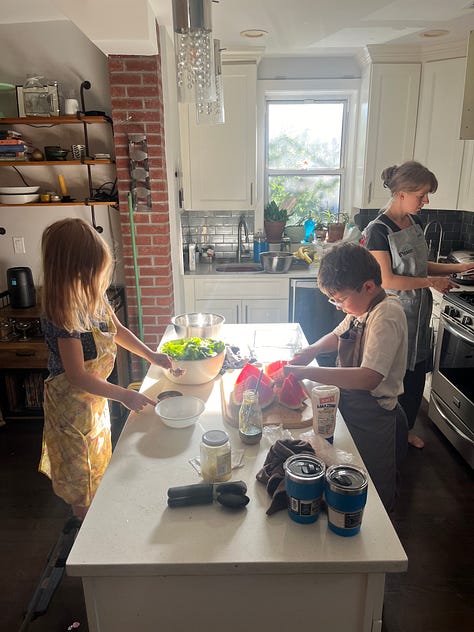Grilled Chicken Skewers with Lemony Herby Drizzle
Plus: A kebab by any other name...
Hey there, If you’ve found your way here but are not yet subscribed for the weekly newsletter, you can do that here. As a paid subscriber, you will never miss a recipe or a story, and I’ll be eternally grateful for your support.
Happy Thursday The Jewish Table readers,
This week’s newsletter is coming to you a little late—partly because of Shavuot break, and largely because life has been coming at me at a nutty and emotional pace these past couple of weeks. I’m nearly 10 years into this parenting thing, and I still get blindsided by how weepy the end of the school year can be—for the kids, sure, but also for the grownups.
In the past few weeks, Yoshie and I have been hit with the following heart-expanding moments:
Bea’s first violin recital
Truly moving end-of-year celebrations for both kids’ classes
Our first family bike ride with everyone on their own bike
Max’s first real concert (as part of a klezmer ensemble at Golden Fest)
Max’s first time on a roller coaster (which freaked me out, but he loved it)
The first time both kids helped to cook dinner, and it actually felt like helping









It has been a lot to take in—to watch the tiny babies I lost so much sleep over begin to come into their own as soulful, capable, big (but still little) kids. I know that the parents among us who are further along in the journey will say, “Just you wait until they xyz.” And I can’t wait for those future milestones (ptu ptu ptu).
But for now, I may feel crazed with deadlines and end-of-the-school year to-dos and packing for summer camp (ugh), and paying for summer camp (double ugh). But for this brief and fleeting moment, I’m content to soak in this season of “big little kids,” because it is pretty exceptional.
A Kebab By Any Other Name
Speaking of seasons (used in the colloquial, #szn, sense of the word), we have also officially entered “skewer season.” Skewer season overlaps directly with grilling season, backyard barbecue season, camping season, and picnic season—a time when eating things cooked outside over a fire feels not only applicable but essential.
Fortunately, Jewish cuisine is filled with skewered foods (typically lamb, beef, chicken, fish, or vegetables) that go by a variety of names and are seasoned with a variety of spices depending on where they are being cooked. Many of these dishes originated in medieval Persia where the word kabab was used for cooked (though not exclusively grilled) chunks of meat.
According to Gil Marks’ Encyclopedia of Jewish Food, “The Persian term was adopted by medieval Arabs and Turks as kebab, and has come to mean different things in different places.” One delicious and ubiquitous example: shish kebab, which literally means “skewered meat.” Another: doner kebab—the Turkish dish of meat grilled on a vertical spit (and the predecessor of shawarma.)
Thanks to the of the massive and hugely influential reach of the Ottoman Empire, the practice of cooking meat and other ingredients on sticks over fire spread widely. Today, you can find frigărui in Romania, ražnjići in the Balkans, arrosticini in southern Italy, tikka in India and parts of Iraq, souvlaki in Greece, and shashlik in Central Asia. Sometimes the meat, fish, or vegetables are cut into chunks and threaded onto the skewer. Other times, as in Middle Eastern kufta kebab, ground meat is formed into elongated patties around the skewer.
“Kebabs, whether chunks or ground meat, are particularly important among Persian, Kurdish, and Turkish Jews, many of whom enjoy them on a weekly basis as well as at celebrations,” writes Marks.
They are also important to the Bukharian Jews living in New York City. A few years after moving to New York in the early aughts, friends introduced me and Yoshie to this Central Asian Jewish community, which numbers in the tens of thousands and primarily lives and cooks in Queens’ Rego Park neighborhood. We soon found ourselves looking for excuses to visit our neighboring borough, just so we could stop at our favorite kosher Bukharian restaurant for their incredible shashlik, which came served with thin slices of raw onion to cut through the delicious, grease-slicked beef and lamb.
Until recently, Yoshie and I did not have access to an outdoor grilling situation of our own—a common dilemma of apartment dwelling. Instead, whenever the craving for smoky, charred foods struck, I made do with a cast iron grill pan. (No shade to grill pans, which can do a lot to approximate the sear of the grill, but they aren’t quite the same.)
That changed a year and a half ago when we moved into our new place in South Brooklyn—a two-family duplex with a gas grill in the shared outdoor space. Since then, we have been making up for lost time and grilling as often as we can. And this week’s Grilled Chicken Skewers with Lemony Herby Drizzle* are a knockout. The chunks of juicy, marinated chicken are cooked over the grill until smoky and glistening. And they are served with a bright and punchy drizzling sauce made from parsley, basil, capers, lemon zest, and chilies.
Call these chicken skewers kebabs, shashlik, souvlaki, or whatever you prefer. Just make sure you invite me over for dinner.
*A note to my pescatarian and vegetarian readers: grill up whatever kebabs you prefer (like these salmon kebabs or these tofu and veggie kebabs) and drizzle the herb sauce over top. Delish.
Which Skewer Should You Use?
There are many different shapes and styles of skewers made from wood, bamboo, and metal. For this week’s recipe, I prefer a flat metal skewer (like this or this), which are sturdy, easy to thread and turn, and don’t roll around on the grill like rounded skewers can. If you use wooden skewers, be sure to soak them in water for 10-20 minutes before putting them on the grill to avoid them singing or catching fire.
Grilled Chicken Skewers with Lemony Herby Drizzle
Serves 4 to 6
Keep reading with a 7-day free trial
Subscribe to The Jewish Table to keep reading this post and get 7 days of free access to the full post archives.



